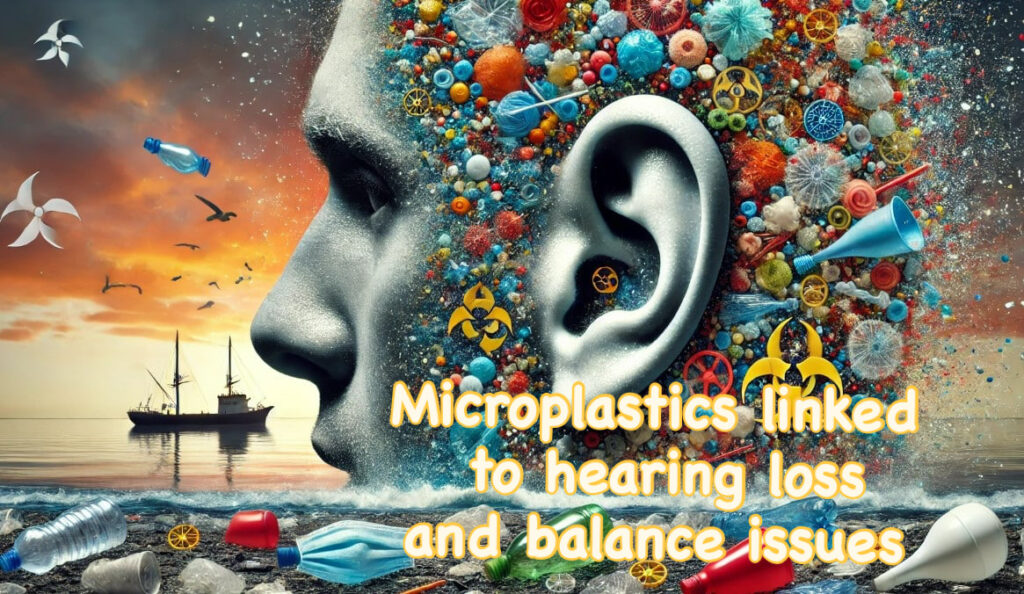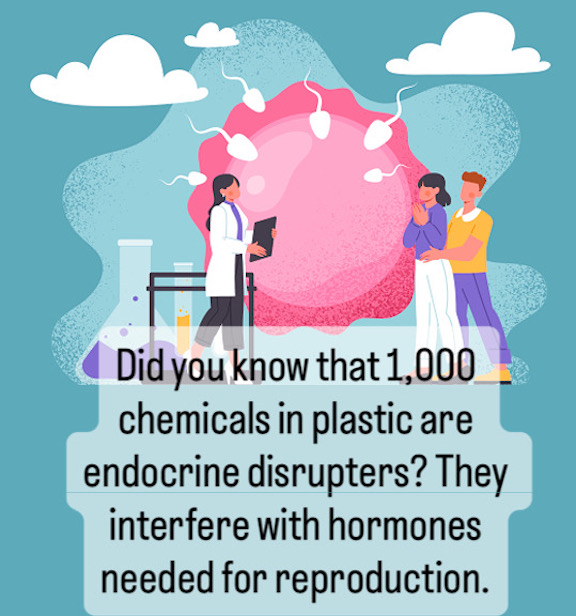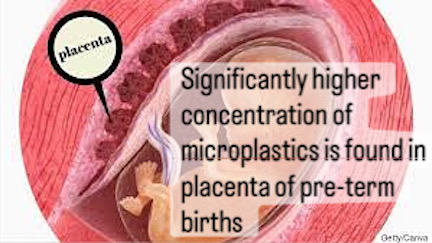Health Impact of Plastic
Plastic has a backbone of carbon and an attached hydrogen, with chemicals forming a non-covalent bond with it. A non-covalent bond means that the chemicals just sit on the carbon backbone. e.g. for PFAS (Per- and Polyfluoroalkyl Substances), the fluorine is attracted to the carbon molecule, and just sits on it.
Plastic has 16,000 chemicals that can be attached to it. The chemicals are known to be CARCINOGENS (cause cancer), NEUROTOXICANTS (cause brain diseases) and 1,000 of them are labeled as ENDOCRINE DISRUPTORS.
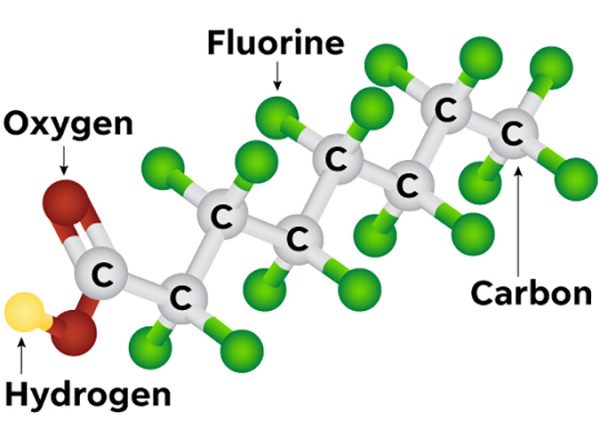
For more information about any of the links between plastic and illnesses, go to the Research page.
Brain Health
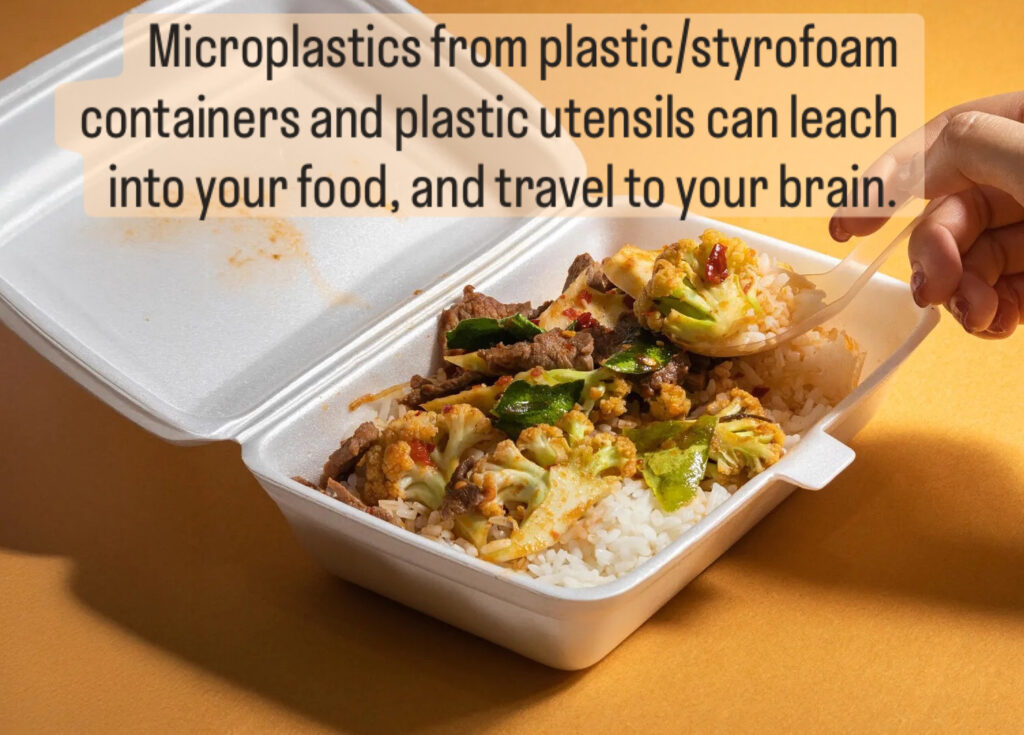
Microplastics and its toxins can accumulate in the brain and trigger memory loss and cognitive decline and Alzheimer’s. See study. Be mindful of reducing plastic in your daily life.
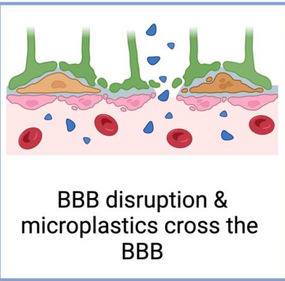
BBB stands for blood brain barrier, not Better Business Bureau. 🙂 It protects the brain from toxins in the blood. When it is disrupted by microplastics in the blood, you get inflammation, neurotoxicity, and neurodegeneration. Neuro means nerves, and your brain is part of your nervous system. In a 2023 study, the corona or contaminants on the plastic surface can determine whether it crosses the BBB. See study.

A recent study published by ScienceDirect shows a significant link between airbourne microplastics and depressive symptoms in college students. See study.
Cancer

Micro- and nanoplastics stay in the cancer cells a long time and are passed on in newly formed cells. This promotes the spreading of tumors to other parts of the body. See study.
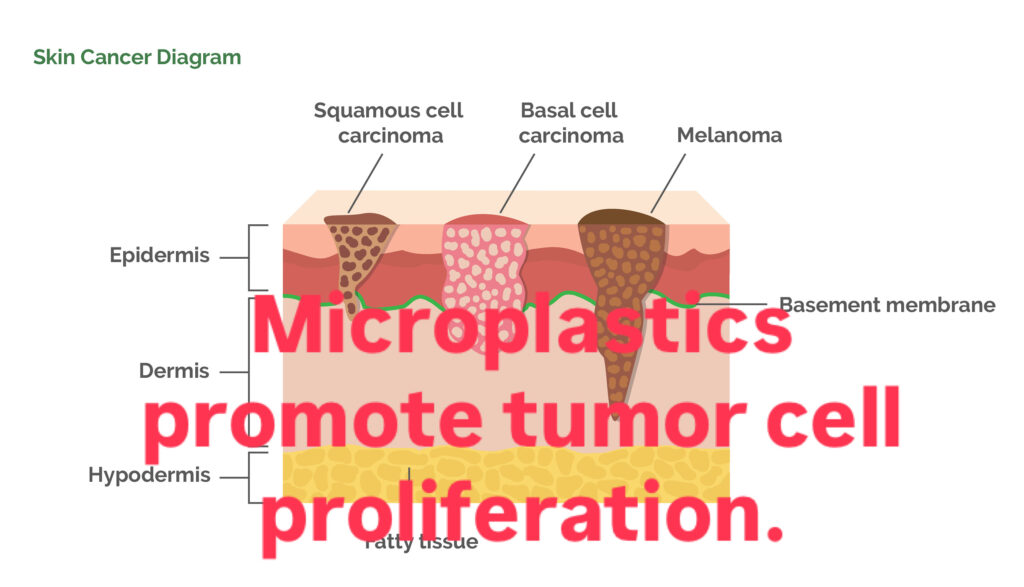
Recent studies show that microplastics exposure promotes the proliferation of skin cancer while causing damage to normal skin. See study. When possible, choose clothes made of natural materials like cotton, wool, silk and linen. Avoid personal care products with harmful chemicals.

Microphages, the immune cells in the lungs, do not eat microplastics. Instead, microplastics weaken the microphages’ ability to absorb bacteria, leading to an increased risk of lung disease and cancer. A week later, te microplastics have migrated to the liver, spleen, brain, colon, and kidneys. While there’s a drug to partly restore microphage function, the better way is to break our dependency on plastic altgeter. See study.

Even low levels of microplastics cause prostate cancer to multiply and slow cancer cell death. See study.

A new study looked at how microplastics induce kidney injury, and affect the circadian rhythms of the kidneys. The kidneys’ internal clock orchestrates the timing of your daily blood filtering, blood pressure, and fluids and electrolytes balance. Disrupting the circadian rhythms can lead to kidney disease. See study.
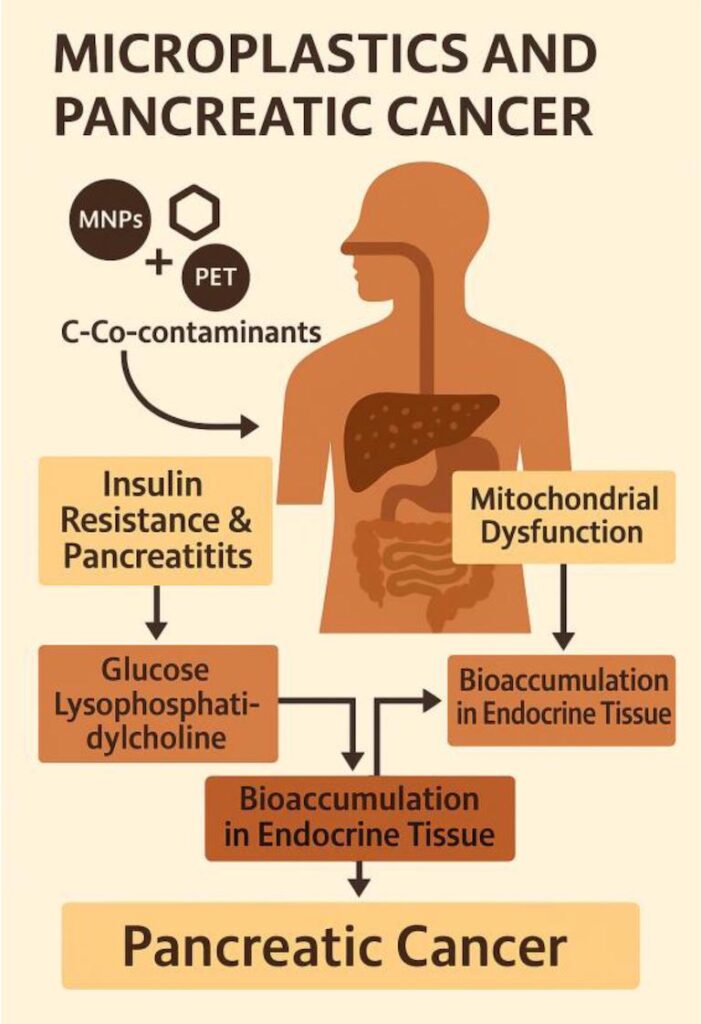
PET microplastics damage the mitochondria, the energy center of cells, increase insulin resistance, and triggers pancreatitis. This leads to chronic inflammation and pancreatic cancer. PET is used in water and soda bottles, peanut butter jars, salad dressing containers, as well as in polyester fabric. See study.

Research has found the mechanism in which microplastics enter the breast tumor cells. Microplastics bind to the protein, Annexin A2, which results in te cells not being able to remove excess or damaged mitochondria (the cell energy center). See study.
Endocrine Disruptors
The Endocrine System
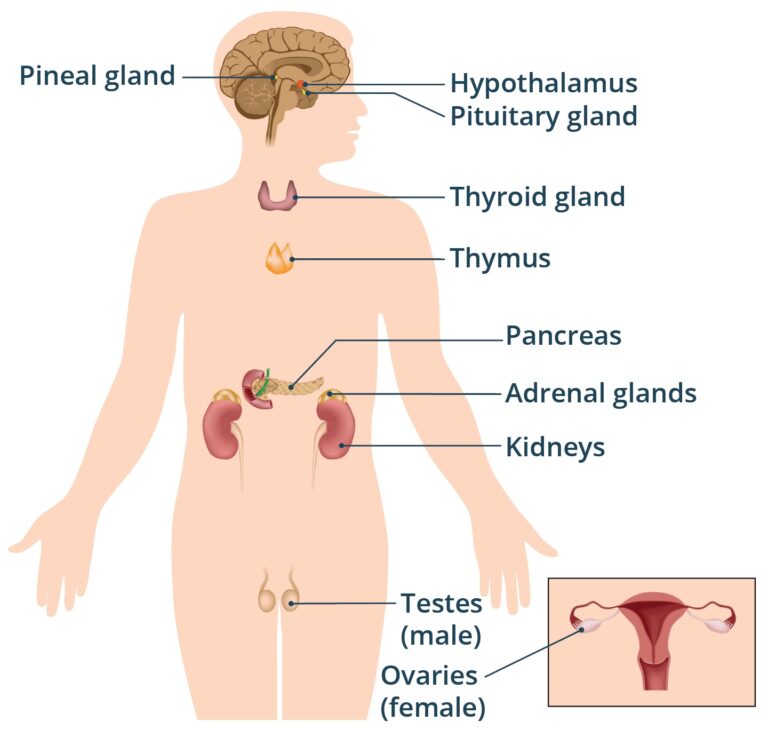
The endocrine system produces hormones. Other than the sex hormones like estrogen and testosterone, we have a number of other glands that produce hormones to regulate everything in our body.

Research has found that the BPA and phthlates (endocrine disrupting chemicals) in plastic increase the risk of Type 2 diabetes, a condition in which the pancreas does not secret enough insulin or cannot use the insulin it produces, leading to high blood sugar. If you have diabetes, reducing plastic usage lowers diabetes risk. See study.
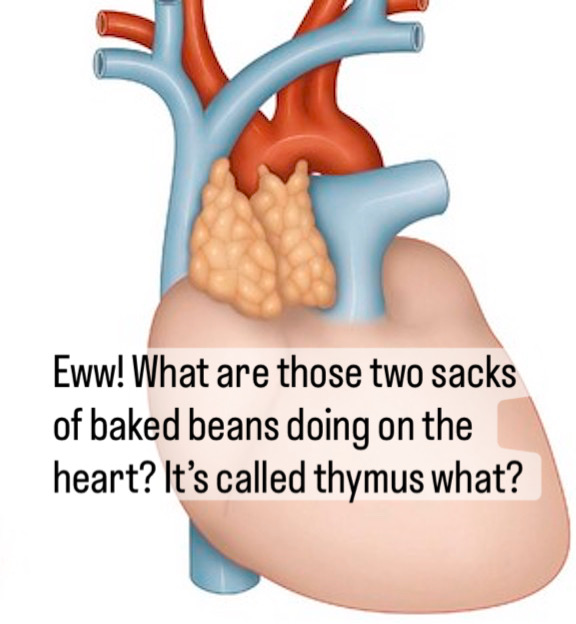
The thymus gland sits between your lungs. It trains special white blood cells called T-cells to fight infection and disease. It is an important part of your immune system. Exposure to microplastics triggers an inflammatory response and causes your body not to be able to fight diseases like cancer, heart diseases, and neurodegenerative disorders. See study.

Endocrine disrupting chemicals like Bisphenol A and phthlates in plastic can block or impair the production of normal thyroid hormones. This can lead to hypothyroidism and other thyroid diseases. The thyroid controls our body temperature, heart rate and brain development. See review of studies.

A low dose of PET microplastics changed 1 gene, but a high dose of PET microplastics for 4 weeks changed 86 genes tat are associated with immune respnse, inflammation, cell growth and repair, and B-cell differentiation in the pancreas, leading to Type I diabetes. See study.
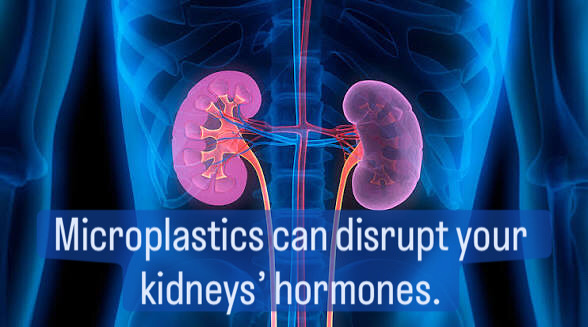
Other than filtering waste products from your blood and excreting them in urine, your kidneys also produce hormones to control your red blood cell production, your blood pressure, and the absorption of calcium and phosphate for bone health. Microplastics can disrupt all your kidney functions. See study.

Microplastics can affect your metabolism, leading to obesity. Specifically, chemicals in plastic, like BPA, disturb hormone signaling and influence lipid metabolism by disrupting adipose tissue on a cellular level. Adipose means storage of fat. Adipose tissue is a critical endocrine organ under your skin and around your organs. See study.
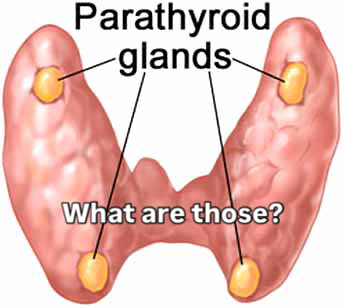
These 4 glands behind your thyroid are part of your endocrine system. They regulate the calcium level in your bones, teeth, muscles and nerves. Effects of nanoplastics include overproduction of the parathyroid hormones, which can lead to osteoporosis. See study.
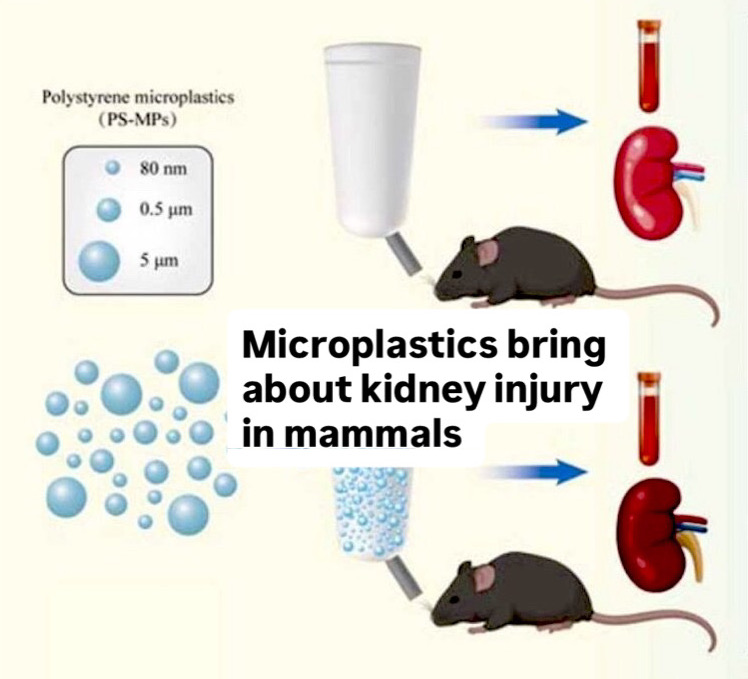
Microplastics induce kidney injury, inflammation and disrupt their circadian rhythms. The kidneys’ internal clock orchestrates the timing of your daily blood filtering, blood pressure, and fluids and electrolytes balance. Disrupting the circadian rhythms can lead to kidney disease. See srudy.
Reproductive Health
Child Health

2023 study at Rutgers NJ Medical School found that the detox of two plasticizers, Bisphenol A and phthlates, is reduced in autistic spectrum and attention deficit children. See study.
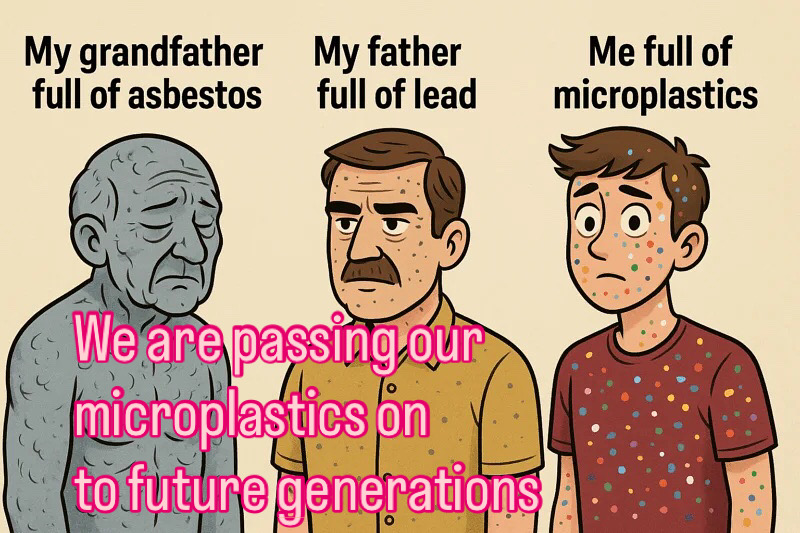
The microplastics in our bodies are being passed on to our children and grandchildren. Microplastics are found in the newborn poop. in the mom’s breast milk, and in the placenta, potentially affecting the fetus and the pregnancy. Prenatal exposure to microplastics has been linked to autism and adhd. See study.

Microplastics are found in breast milk. See study. Reducing your own plastic usage would also protect your baby. Adverse effects of microplastics stay with the child resulting in higher risks of major health problems as they grow older.

Major sources of microplastics in babies and toddlers come from food (powdered formula, water, plastic bottles, spoons), feeding items (bottles, sippy cups, coated cups), and from crawling on dusty floors, plastic toys, and synthetic fabric. Plastic exposure leads to neurodevelopmental and respiratory problems. It can also lead to organ damage, autoimmune diseases, heart diseases, and cancer in adulthood. See study.
Other

A study in 2024 showed that aged microplastics coupled with UV radiation exposure increase toxicity and can lead to hair loss. The aged microplastics damages the Tight Junction barrier between the skin and hair follicles, and affects the adhesion between hair shaft and the follicles, leading to hair loss. See study.
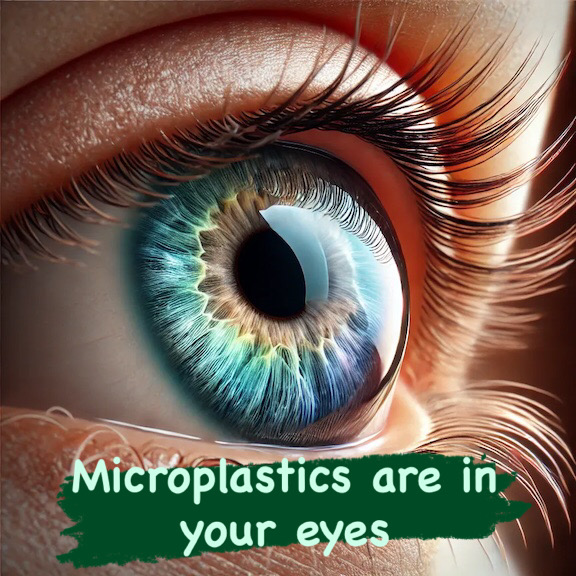
A study in 2024 showed that rats exposed to microplastics had more pronounced cataracts and age-related macular degeneration. In addition, they showed signs of Alzheimer’s Disease. See study. Another study found microplastics: nylon, polyvinyl chloride and polystyrene, inside the eyes of patients with eye diseases. See study.
